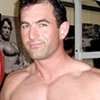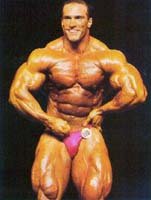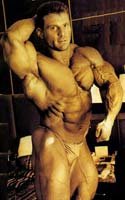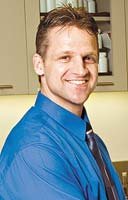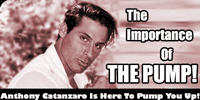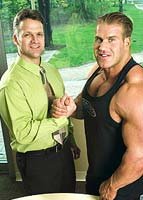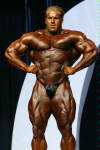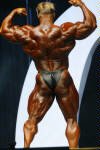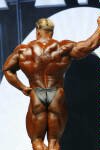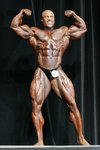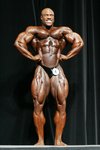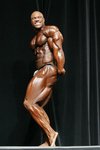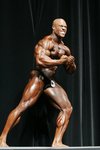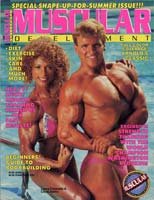At an age when most bodybuilding enthusiasts are just beginning to master the training and nutrition basics, well-established bodybuilding guru, Chris Aceto, was to begin his rise to fame working alongside the likes of Lee Haney, Rich Gaspari and Lee Labrada at the 1987 Los Angeles Pro Muscle Camp.
Having been selected from thousands of applicants, Chris, 20 at the time, knew this was the opportunity of a lifetime. 20-years-later he is widely known as one of the most knowledgeable experts within the bodybuilding industry.
His resume includes work with several high profile athletes, among them '90's greats, Mike Francois and Paul DeMayo, and current Mr. Olympia Jay Cutler.
As a respected coach and consultant, Chris, a Springfield College graduate who holds a degree in Applied Exercise Science, has that rare ability to understand, on an individual level, just what his clients require to build and fine-tune their physiques. And ever since Joe Weider contacted him in the early 90's and asked him to write some "art-a-culls" for Muscle and Fitness, he has presented his training and nutrition advice to the masses.
As well as advising top athletes, Chris, a former bodybuilder himself and winner of the Collegiate Mr. America, currently works on behalf of top supplement company Muscletech, assisting with product research. Good news for Muscletech in that as far as bodybuilding advice goes, there is probably no better voice than that of Chris Aceto.
In the following interview he discusses his role as consultant and coach to the champions and, in typical fashion, provides some great advice for beginners and advanced trainers alike.
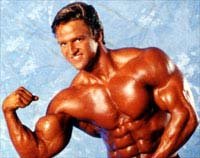
Chris Aceto.

[ Q ] You are known as an expert in the fields of sports nutrition and training. How did you get started in these industries?
When I was attending Springfield College I read an ad in a magazine requiring a trainer for a bodybuilding camp that was taking place over the summer in Los Angeles. It was quite a big deal as all the top bodybuilders of the day were to be there: including Haney, Gaspari, Labrada, Strydom, and Mike Christian.
I sent in my application and was pretty shocked when the owner of the camp called me up during winter break. We set up a phone interview and surprisingly I got the job. I was one of, I believe, seven or ten out of possibly thousands of applicants to get the nod.
The owner, David Zelon, took a really big chance on me. At that time, I did not hold a degree and I was only 20 years old. Everyone else chosen to work there had advanced degrees in nutrition or exercise physiology and was much older. I guess David thought my young age might hinder my ability to deal with the potential situations.
Before I came out to LA, he warned me on the phone "You better not let me down or I am shipping you right back to Maine!" But it worked out great. Next thing I knew, I was living in LA each summer working with very knowledgeable individuals as well as the best bodybuilders on the planet. Not a bad job to hold for a twenty year old.
Once I graduated, I remained in LA. From there, Ed Connors, the owner of Gold's Gym offered me a deal I could not refuse. In exchange for helping a few bodybuilders with diets, he gave me a free office in Gold's gym, complete with parking, phone, computer and a secretary.
I set up my nutrition practice and things just took off immediately. Soon thereafter I signed a contract to write for a bodybuilding publication and consult with what was, at the time, the leading sports nutrition company.

[ Q ] What was the name of the first bodybuilding publication you wrote for? How did this come about? 
Muscle & Fitness was the first. Joe Weider called my Gold's Gym office and said, "This is Joe Weider. I want you to write some "art-a-culls" for me.

[ Q ] What do you feel have been some of your bigger success stories and why?
If you are talking about coaching bodybuilders, it's, in this order, Jay Cutler, Mike Francois, Paul DeMayo. I worked with all of these bodybuilders from amateurs all the way through to seeing them turn pro and, in two cases, excel at that level.
Keep in mind; I've had very few clients so to have three go from amateurs to pros is, in my book, success. I've been in Jay's corner since he was 18. Ironically, I was in New Orleans with Paul DeMayo at the Junior Nationals when I saw Mike. Paul got 3rd at that show and Flex Wheeler was second.
Mike didn't make the top ten. However, I started working with Mike soon after and he went from not placing at a junior level show to winning the Arnold Classic three years later. I worked with Paul on and off from the time he was 20 to his 13th placing at the Olympia. That's the tangibles.
The intangible element of success, the one that I am also proud of is that I don't think I have sacrificed anything in terms of values along the way. You will not find any seedy stories about me anywhere. I have not done anyone wrong and have always put the interest of the bodybuilder above mine whenever I was helping anyone. I've always tried to be courteous to people in the sport as well.

[ Q ] And the athletes you have worked with have been featured in some of the many articles you have written. As a writer you have reached millions of people around the world with your knowledge. Tell me more about your writing career. What do you enjoy most about this profession?
I like that, in some small way, you get to impact other people. That they actually benefit from what you are doing or saying. I see a lot of what I have written over the years re-hashed, copied and repackaged. At times, I thought I had written some things that had been pretty darn novel.
Those ideas, in turn, often show up in other places as if the person writing them, or the company using them to promote a supplement whipped them up out of the blue, from thin air. Two quick examples: no one really was following a super low carbohydrate diet in the very early 90's. I was. And, I tried writing about it - extremely low carbohydrates - in a major publication, only to end up duking it out over the phone with a science editor.
When the article finally appeared, it said something like, "Warning: the article you are about to read is only the author's opinion. We don't recommend you really follow it." Point is; I was touting low carbohydrates a long, long time ago. Also, I just finished a book for Muscletech in which an important part dictates bodybuilders do not do cardio.
So there's another idea you'll see; "Don't do cardio." It's, more or less, a waste of time if you want to get ripped and end up looking like your muscles are actually hard.

[ Q ] What approach do you take when working with your athletes?
I have three rules:
- Treat each competitor as if the contest he is prepping for is the most important and pivotal moment in his life.
- Never compare what worked for one bodybuilder with another. Make the plan for him his own, something that is totally unique.
- Never second-guess the decisions you make.

[ Q ] And what is most important for bodybuilding success in your view, training or diet? 
That's easy. Diet. You can train like a wimp, but if you eat right, you can look pretty darn decent.

[ Q ] That seems to be a common sentiment among bodybuilding training and nutrition experts. As one whose guidance is sought by some of bodybuilding's top names, it is clear you know a thing or two about what works and what does not. What training nutritional rules should all bodybuilders who seek maximal size follow?
Listen to your body. That is still number one, yet it's the hardest thing to teach. If you are fatigued in the gym, cut the workout short. Don't be so damn insecure to do so. Likewise, if you are getting a killer pump, work it, keep training and don't let conventional wisdom limit how many sets you do that particular day.
| RELATED ARTICLE | ||
|
If you get a killer pump, why the heck would you stop training a body part? And, if you are getting absolutely no pump, please give me a single reason to continue to train?
Nutrition wise, that's a mixed bag. For most people, they have to meet their protein needs. Though, they can benefit also from taking leucine-based anti-catabolic supplements like Leukic or nitric oxide boosters like nanox9. Those are things I use and recommend. Course, you have to eat lots of carbohydrates to train hard too, but a lot of people just eat too many simply cause they like to eat.

[ Q ] What training mistakes do beginners typically make and what advice would you give these guys to correct them?
Don't copy pro bodybuilders. They eat too much for someone just getting started. I would, say, eat four times a day and take three small protein shakes. That's the foundation.

[ Q ] You have developed a respectable physique yourself. Where do you get your training and nutrition advice? Are you, in some respects, your own laboratory? 
Well, I've been training a lot of years so you just, more or less, figure things out. I just went through a "before and after" process with Muscletech. I just listened to my body. I can't tell you how many sets I did, reps, weight, any of it.
I really relied on what my body was telling me. I also didn't do any cardio unless you consider watching American Idol, The Apprentice and taking Hydroxycut Hardcore as cardio. Ok, I'm being sarcastic, but the truth is, I didn't do any.

[ Q ] Tell me more about you involvement with Muscletech. How have they become leaders in supplementation?
Jay Cutler signed with them a few years back. He had all kinds of offers on the table. Being Jay, he didn't just jump, but went up to Toronto to see what this company was all about. When he got back, he told me "Chris, this company is unbelievable."
He told me about their products, their unmatched quality and their budget where they fund research, in hopes of creating new supplements that are effective. I value what Jay says. A couple years later they approached me about coming on board as a member of their team. The rest, at least so far, is history.
I've done a transformation which was very exciting, a book called The Hydroxycut Revolution, and I do a twice weekly blog on their website. They became the leaders in supplementation by setting the bar extremely high and eclipsing that each and every year.

[ Q ] Bodybuilding nutrition is an area where many mistakes are often made. What are some of the major mistakes both beginner and advanced athletes make and how would you address these areas?
Well, bodybuilders make the mistakes everyone makes in all other aspects of their lives, myself included. We rush things and expect huge things to happen too quickly. Building mass is a process that takes time and consistency. That's a big "secret" if you want to call it that.
Beginners usually train too often and fail to understand that what you eat is still more vital than how often you train. Advanced bodybuilders? They usually listen too much to too many people. Too many opinions will only end up confusing the bodybuilder, which makes it hard for him to really listen closely to what his very own body is saying.
Pros? They'll deny it but many of them surf the web subconsciously monitoring who insulted them and said they came in "off" at their last show. Seriously. That, in turn, causes them to end up training and dieting based on what others say.

[ Q ] Beginning bodybuilders are often confused as to the importance of fats in the diet. How important are fats to a bodybuilders diet?
Not as important as protein, and a little less important than carbohydrates. Protein equals rebuilding and repair. Carbohydrates are the fuel for the training, but some fats regulate hormone production and hormones are an intricate part of the growth equation.

[ Q ] Another dilemma. The last week before a show is for many, fraught with difficulty. What tips would you give a competitor who wants to dial it in perfectly?
Deplete like mad. Load like mad. That works. However, if you get one wrong you are screwed. For example, if you deplete like mad and mildly load, you'll be flat. On the other hand, if you deplete mildly and load like mad, you'll be watery. However, if you do them both, you can really transform yourself that final week.

[ Q ] One bodybuilder who obviously knows how to load and deplete effectively is Jay Cutler. Among the champions you have worked with to date, you say Jay is you most successful. Without giving too much away, what special requirements does a man of his size and experience need from you?
Well I taught him how to throw a football and spot an open man downfield. Oh, you mean the other Jay Cutler. Our relationship has rightfully evolved to where I was, at one time a captain. "This is the way we'll approach the show Jay."
Over time, the role has changed to a place where I am like a tugboat. He's on his way into port, to take his second Mr. Olympia, and he'll ask me to review what he is doing and give him my input. He's the Captain and makes all the decisions, though any good captain still needs a good tug to help him dock the ship.
[ Q ] What special training and dietary requirements are needed for a bodybuilder of Jay Cutler's calibre?
Jay is in a very different stratosphere than most bodybuilder's. He trains harder then most, if not all, so his nutrition demands are immense. The nutrition requirements include 1000 carbohydrates a day, 400 grams of protein as well as anti-catabolics like Leukic, Creatine synthesizers and Creakic.
He eats around the clock every two hours. I think what is unique about Jay's nutrition is the quantity as well as the quality. You will not find Jay Cutler at McDonalds. Period.

[ Q ] Who do you feel could be the future of bodybuilding and why?
Phil Heath 'cause Jay Cutler told me that no one, and I mean nobody, had heard of him. Plus, Jay's always right.

[ Q ] What about Phil Heath impresses you? What makes him top tier material?
I am just quoting Jay. I said, or meant, Phil impresses Jay. I have only seen photos of him and his conditioning has been great and he looks balanced with great arms and a good taper.

[ Q ] As one who has followed bodybuilding for many years and who has worked with a number of its top competitors, what are your views on the current state of the sport? Have the physiques improved?
The physiques have gotten bigger. I mean Arnold was pretty freaky right? H*ll, that was over 30 years ago. Is Jay bigger? No Doubt. Better? That depends on how you define better. No doubt though, overall, the physiques of today are bigger with better condition.
The state of the sport? I am not sure. Is bodybuilding, as a sport, more respected or less respected then 10 years ago? How do you measure that? I would like to see pro bodybuilders make more money because, for the most part, they deserve it.
They work extremely hard and are the true foundation upon which everyone else in the industry mines their fortunes. The magazines can't put out a product without them. And, without the magazines, there is not a viable vehicle in which to put supplement ads.

[ Q ] That being said, what could be done to improve bodybuilding?
Frankly, I don't like to pick up a gossip rag. However, that's what a lot of the stuff is in the magazines. It's the Jerry Spingerization of bodybuilding. Do I really need to know what King Kamali said about so and so? Who does he now have it in for? Craig Titus was never anything special, yet his trash was always in the magazines.
Tell me about Melvin Anthony's biblical studies and how he thinks it has helped him in his pursuit of becoming a better bodybuilder. Tell me about Darrem Charles - anything! The guy wins shows and gets zippo coverage and he's a damn good guy.
Tell me, in detail about Gustavo Badell - how he came from nothing to twice getting third at the Olympia. There has got to be something there that people want to know. I remember seeing him backstage at the English grand Prix. He got smoked, but I thought he looked incredible.
Granted, I never saw him accomplishing what he has accomplished; my hat goes off to him. But please tell me the story of how he hung in there. Why he hung in there. Detail the training and nutrition stuff, but tell me about him. The person. I think that's a good step. Otherwise, I'm out of ideas.
Learn more from Chris at the following:
Website: www.nutramedia.com
